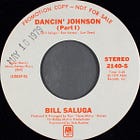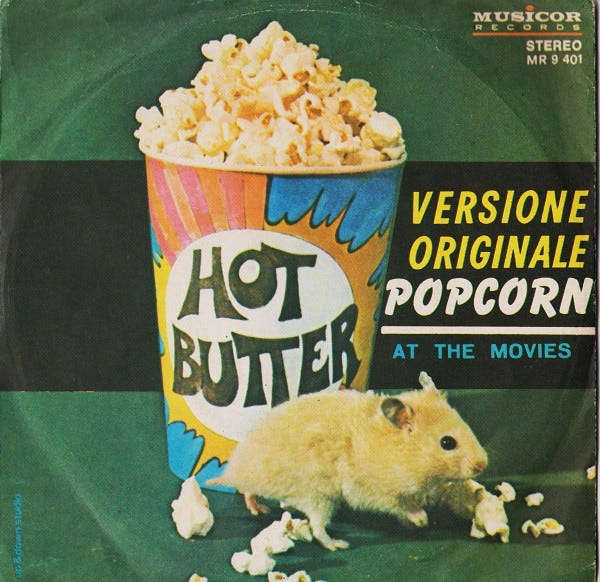Beatles, Disco and Popcorn
Three things that make life worth living
Greetings, Jagged Time Lapsers!
Before we get down to bidness, I’d like to thank all the new subscribers, free and paid, who’ve joined up in the last week or so. Just wanted to let you all know that the voluminous JTL archives can be found HERE, and that most of the stuff in there is pretty “evergreen” — so if you’re in need of some good music reading beyond the latest newsletters that I lob into your inbox a few times a week, please go on in and have a look around.
While I generally do try to keep Jagged Time Lapse more focused on the middle and far distance than on current events — one of the things I’ve really come to hate about music journalism in the internet age is the apparent need for every new release to be immediately met with a hot take proclaiming it either THE BEST THING EVAR or worthless trash — and I also tend to focus on one topic per newsletter, a number of people have asked me for my thoughts/opinions on a couple of music-related things that happened this week. So I’m gonna go ahead and get those appetizers outta the way before we move on to the main course...
The Beatles — “Now and Then”
So yeah, the Fab Four (or the Fab 2+2, depending on how you feel about living musicians making records with deceased ones) released a new single this week, and a lot of people have really passionate opinions about it, pro and con. Some folks I know love it and have even been moved to tears by it, while I’ve seen others scream bloody murder about everything from cash grabs to necrophilia.
After about a half-dozen listens, I’m finding “Now and Then” to be charming but slight. I love the song’s melancholy mood and feel — especially those mournful piano chords — and it’s nice to hear John singing something new (or new to me, at least). The production is fine, the strings are nice, Ringo is wonderfully Ringo, and I have no issue at all with Paul trying to “do a George” on the slide guitar solo (even if it doesn’t pack the emotional bite of George’s instantly-recognizable slide playing). But only the verse melody really sticks with me, and what the hell is up with those backing vocals on the chorus? Even though they’re mixed low, they sound really weird to me, and not in a good way; I could swear I hear Paul gargling pop rocks into the mic at certain points…
As posthumous Beatles songs go, I really liked “Real Love” and pretty much hated “Free As a Bird” (Paul’s trying-way-too-hard bridge really killed that one for me), though I did buy the latter for its previously-unreleased B-side “Christmas Time (is Here Again)”. For me, “Now and Then” lands somewhere between them; it’s pleasant enough, I’m glad it exists, and if Paul and Ringo wish to commune with their missing mates in this manner, then more power to them — they sure as hell don’t owe me (or you) anything at this point. But I just don’t dig the song enough to actually buy a vinyl copy, especially since its b-side is a new stereo remaster of “Love Me Do,” which is one of my all-time least favorite Beatles songs. For me, the best, most interesting and most emotionally affecting part of all of this “new” Beatle action is this mini-doc that was released a few days ago about the (re-)making of the track:
The War on Disco
Speaking of documentaries, PBS aired one this week called The War on Disco, which takes yet another look at the cultural divide raging over disco back in the summer of ‘79, using the Chicago White Sox and WLUP’s Disco Demolition Night promotion as its focal point. Several friends recommended it to me; I tried to watch it, but was completely turned off by its repeated claims that US radio stations immediately ditched disco following Disco Demolition Night, claims which perpetuate the pernicious myth that WLUP deejay Steve Dahl and his anti-disco forces somehow “killed” disco.
I’m sorry — speaking as someone who was actually there and paying attention, I can attest that disco remained a big part of mainstream US culture well into 1980. Three months after Disco Demolition, the Pittsburgh Pirates celebrated their 1979 World Series championship to the tune of their theme song, Sister Sledge’s disco smash “We Are Family”; and Lipps Inc.’s “Funkytown,” a disco jam if I’ve ever heard one, topped the Billboard charts in May and June of 1980. These are just two examples that are easy enough to look up, but if you’re going to pretend they didn’t happen — and let’s not even get into the film’s comparing Disco Demolition to the January 6 riot — I’m just not going to waste my time with your doc.
I loved a lot of ‘70s disco back then, and I still love it now. But there were a lot of factors involved in both Disco Demolition Night and disco’s commercial decline, and it really grinds my gears when people reduce the story to broad black-and-white strokes. I still stand by what I most recently wrote about it all:
As we get further and further away from July 1979’s Disco Demolition Night at Comiskey Park, the late-’70s disco backlash has been painted in increasingly stark terms, with disco lovers on one side and racists and homophobes on the other. Which was partly the truth, but there was a lot more nuance to it as well… what was once a vibrant underground cultural movement had been fully transformed into a disposable commodity in just a few years, by an entertainment industry seeking to squeeze every last egg from its golden goose before consumers lost interest. And consumers lost interest a lot earlier than they might have, thanks to all the crappy disco they were force-fed. Ultimately, disco’s greatest enemies were not the troglodytes who sought to destroy it, but the greedheads who sought to exploit it.
And if you want to read the entiree JTL post on that subject, you can find it here…
Popcorn
Judging by various social media threads I’ve seen this week, the PBS doc has brought a lot of “I always hated disco” commenters out of the woodwork, who have been largely met with cries of “Racist!”, because that’s the general level of human discourse these days. I believe that it’s entirely possible to hate an entire genre of music for reasons that have absolutely nothing to do with how you feel about the people or culture that made it, though I also believe that taking that kind of hard-line stance against any form of music is kind of silly, as well as ultimately very much to your own detriment.
Case in point: Synth-Pop, which I actively loathed, dismissed and downright railed against back in the 1980s. This did not mean that I hated the skinny British and German guys with acrobatic haircuts who made the music; I was just firmly (and rather delusionally) convinced that guitars and drums conveyed real human emotions, maaaan, and that synthesizers and electronic percussion were cold, sterile and generally devoid of humanity.
As a result, I missed out on a lot of great synth-driven music from the ‘80s and earlier — I even turned up my nose at Kraftwerk and Brian Eno in those days — because of my narrow-mindedness on the subject. It wasn’t until a mid-’90s epiphany experienced while listening to Gary Numan and The Tubeway Army’s “Down in the Park” that I finally realized just how badly, and stupidly, I’d goofed.
The fact that I’d even felt such virulent anti-synth prejudice is, in retrospect, pretty hilarious given that one of my first favorite songs was the very epitome of synth-pop: “Popcorn,” the 1972 hit by Hot Butter. An international smash composed by electronic music pioneer Gershon Kingsley (who recorded the original version on his 1969 album Music to Moog By), “Popcorn” was an absolute gas, a giddily propulsive instrumental driven primarily by burbling, bubbling Moog synthesizer lines. And in the fall of 1972, “Popcorn” was absolutely everywhere — on the radio, in children’s TV shows, in commercials and station-break bumpers, and even in my elementary school gymnasium, where my first grade gym class learned a simple series of synchronized dance steps to perform along with it. (And boy do I wish there was video of that.)
I didn’t know what the song was called or who did it — not like I needed that info, since it wouldn’t have even occurred to me to ask my mom to buy me a copy — but I would get absolutely lost in its bleeps and bloops every time I heard it. Sure, the record was kind of a goofy novelty on one level, but I remember being deeply, almost physically moved by the way the music modulated from major chords to minor and back again. It felt like the robotic music of the future (which it very much was), but it also had the swirling, harmonically rich feel of the classical music my dad liked to listen to when he wasn’t grooving to The Eagles.
I rediscovered “Popcorn” while in college, but it took me many more years to realize what a groundbreaking piece of electronica it was for its time. I still get lost in the song to this day — it’s kind of amazing to me that it’s only two minutes and thirty seconds long, because every time it ends I feel like I’ve been gone for hours, like one of those microdose trips that crams a full-on psychedelic experience into just a few minutes.
But what really amazed me, once I started digging in to “Popcorn” and its history, is how many different versions have been recorded — as well as the fact that some of them don’t even use a Moog, but still manage to sound really good. Kingsley’s melody and chord changes are, apparently, enough to put the song over even without the synth’s futuristic pulses and timbres.
Dig, if you will, some of my other favorite “Popcorns”:
Gershon Kingsley (the original 1969 version)
UK easy listening pianist Ronnie Aldrich
Italian combo La Strana Società
Seidat — “Sumu” (with Finnish lyrics!)
Yvette Horner on the accordion!
The Muppets (starring The Swedish Chef)!
All right — that’s all for this week, folks. Have a fantastic weekend, and I’ll see ya Monday. In the meantime, enjoy your popcorn!




Those hardlines ("disco sucks!" "I like anything but country" ) are so easy to draw. You're right though; in the end it means possibly missing out on some great music. I certainly did.
I'd extend that to include guilty pleasures. We're (collectively) good at turning our noses up at what we think might be a silly song, but if it brings someone joy, what's the fuss?
I'm not claiming any moral high ground here--there are still a couple of songs that make me reflexively annoyed--but I'm much more open to hearing a song/style I used to shut out. And if a track moves someone (or makes 'em move), that's a good thing.
P.S. Not for nothing, The original Portland Timbers were still playing Kool & The Gang's 'Celebration' at games after 1979.
Funny side note about Popcorn: Stan Free, a jazz pianist, arranger and composer who was in Hot Butter was the high school music teacher at my school (Walden in NYC, now defunct) and would play Popcorn at the drop of a hat. While my brother got to work with him and played in a well-drilled jazz band that Free organized, by the time I got to HS, Free had left or retired.